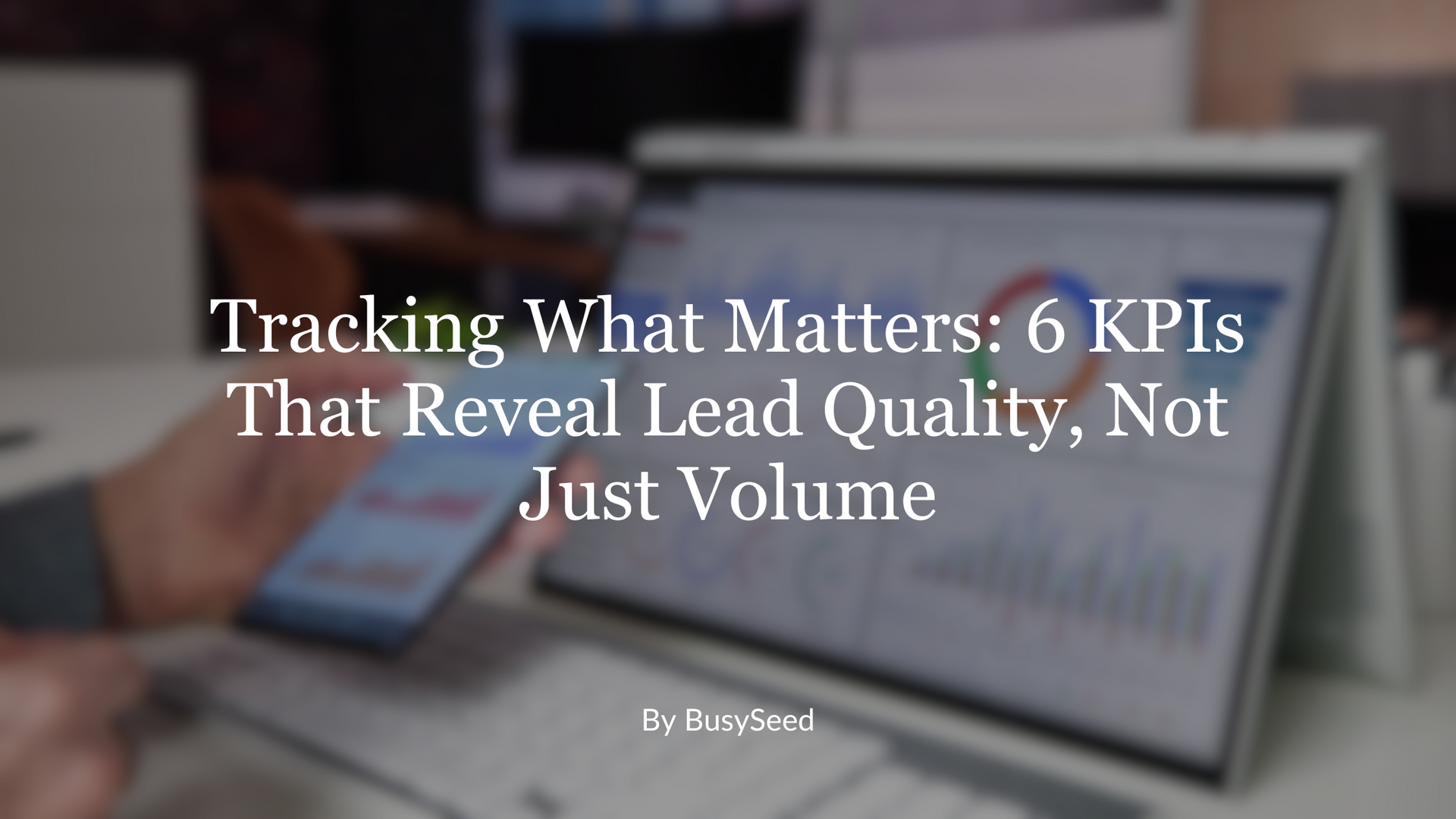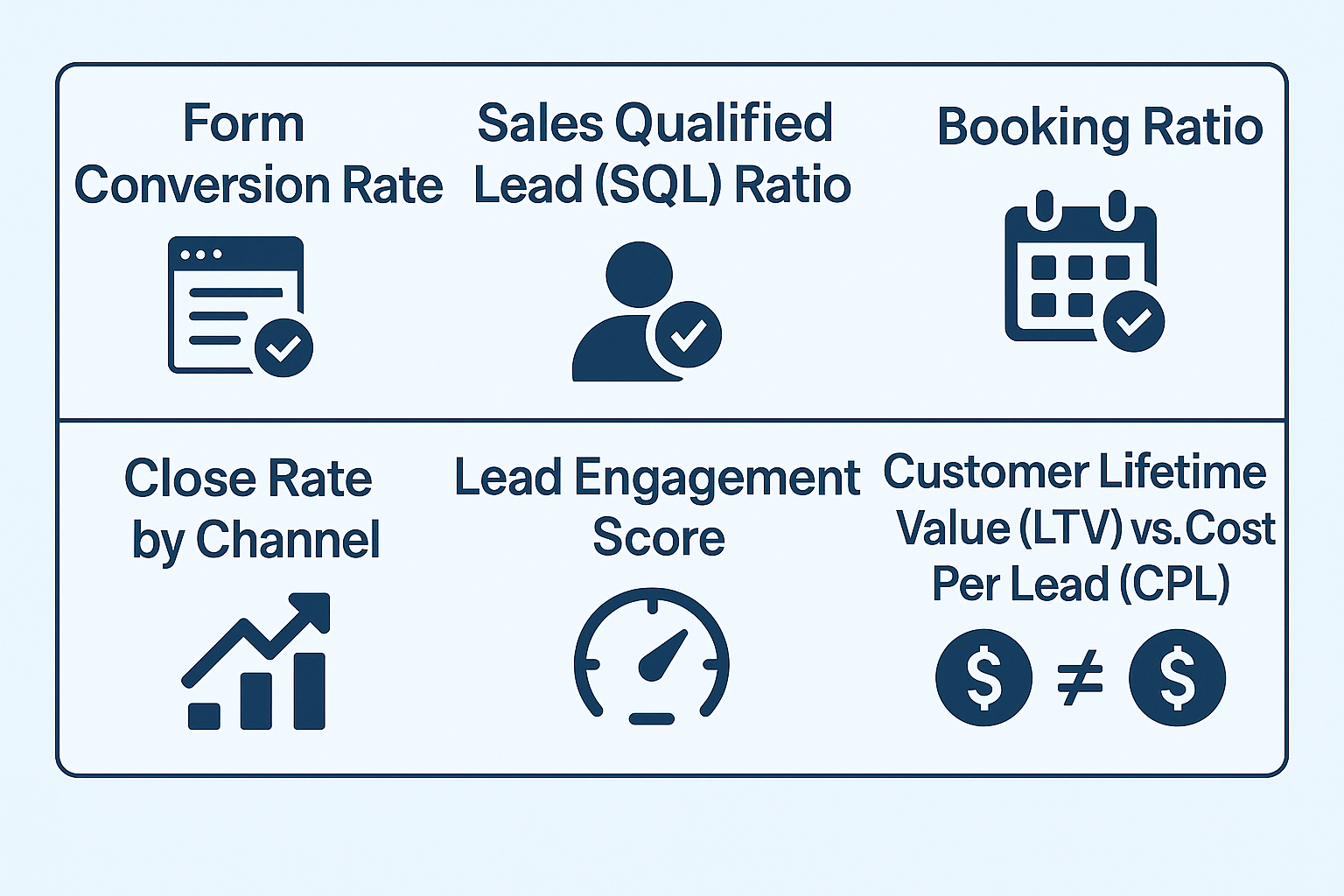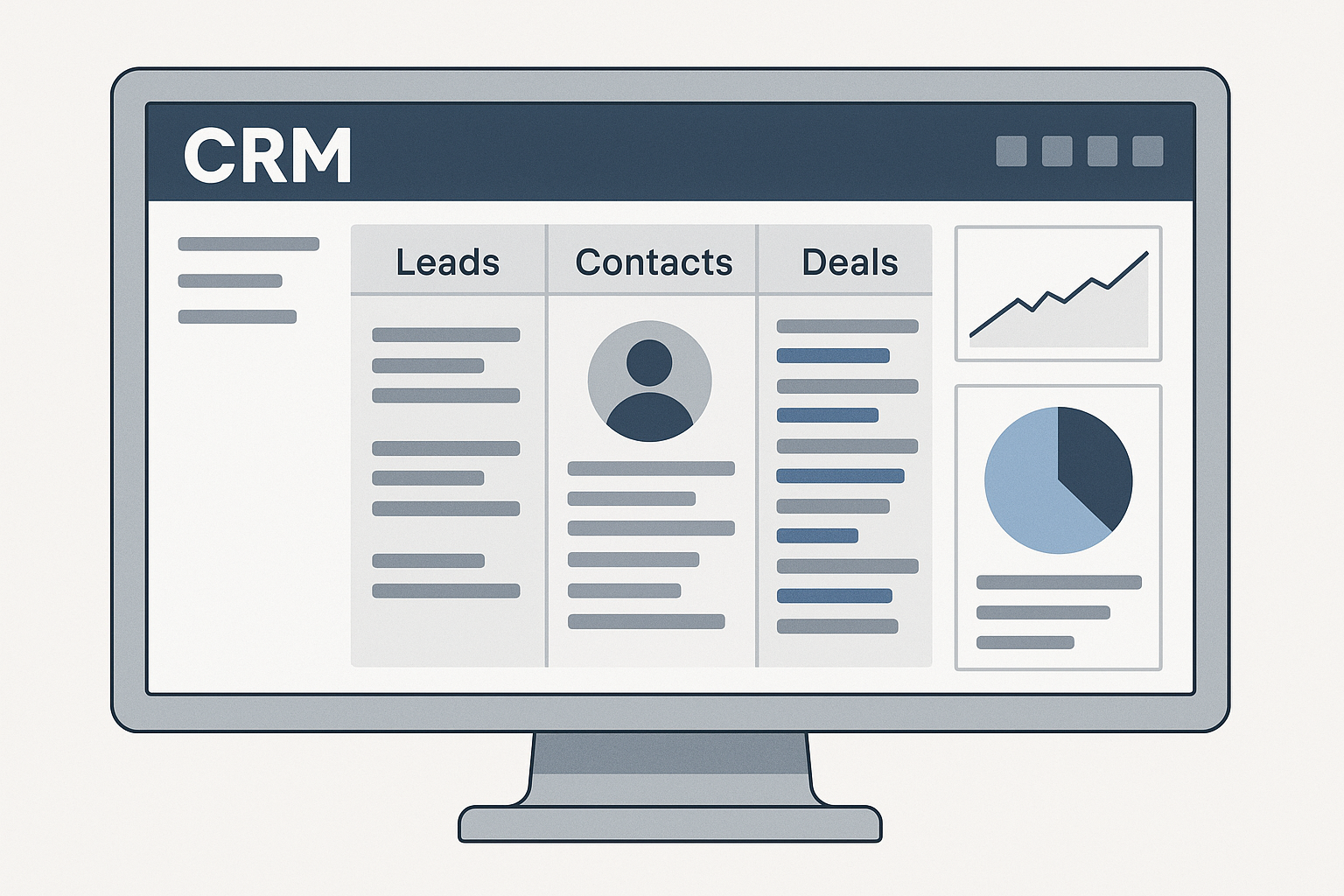Tracking What Matters: 6 KPIs That Reveal Lead Quality, Not Just Volume
Ask any experienced marketer, and they'll tell you: high lead volume is excellent, but quality leads are what truly drive revenue. For many New York ad agencies and business owners, success isn't just about getting attention. It's about converting that attention into real business outcomes.

At BusySeed, we've spent the past decade partnering with over 500 businesses, ranging from Fortune 500 companies to startups, to help them track what matters: high-impact KPIs that dig deeper than vanity metrics. Today, we're shining a light on what you should really be measuring after the click. Whether you're working with top NYC advertising agencies or managing an in-house team, these are the six KPIs you can't afford to ignore.
Let's get into it.

What Are KPIs? Key Performance Indicators, Defined
Before we dive in, let's quickly answer the big question: What are KPIs, key performance indicators? Key performance indicators (KPIs) are measurable values that show how effectively a company is achieving specific objectives. When it comes to marketing and advertising, KPIs connect activity (like clicks or impressions) to real business outcomes (like revenue or customer retention). So if you're wondering "what are business KPIs?"—they're the cheat codes for finding out what's working and what's not. And if you're only looking at click-through rates or website visits, you're leaving critical data—and dollars—on the table. Understanding what are KPIs, key performance indicators, are is fundamental to any successful growth strategy.
Why Lead Quality KPIs Matter More Than Just Volume
It's tempting to celebrate a campaign that generates thousands of leads. However, if those leads never convert, your ROI won't last long. Tracking lead quality KPIs tells you which channels, campaigns, and strategies are delivering buyers, not just browsers. Here's why top NYC advertising agencies obsess over these KPIs:
- You stop wasting money on underperforming lead sources.
- You get a clearer picture of your actual customer acquisition cost.
- You improve alignment between marketing and sales.
- You focus on what truly scales business growth.
By focusing on these lead quality metrics, businesses can make data-driven decisions that lead to sustainable growth. This strategic shift from volume to quality is a hallmark of effective marketing, particularly in competitive markets where every dollar counts. Examples of KPIs in lead quality help refine your approach to customer acquisition and retention.
Tracking What Matters: 6 KPIs That Reveal Lead Quality
1. Form Conversion Rate
What it is: The percentage of visitors who complete your form after clicking on your ad or landing on your site.
Why it matters: The form conversion rate indicates how compelling your offer is and how effectively your landing pages perform. A low rate can mean poor message match or too many friction points (like unnecessary form fields). This is a crucial indicator for any New York ad agencies aiming to optimize client campaigns.
How to improve it:
- Use multi-step forms to avoid overwhelming visitors.
- Reduce the number of fields—stick to essentials.
- Optimize headlines and CTAs to align with ad intent.
- A/B test different form layouts and field requirements to identify what resonates best with your audience.
2. Sales Qualified Lead (SQL) Ratio
What it is: The percentage of total leads that your sales team deems qualified for outreach or conversion.
Why it matters: No matter how many leads pour in, if your sales team doesn't want to follow up on them, you've got a quality issue. This KPI ensures your lead gen isn't disconnected from business outcomes. It helps answer the question, "what are business KPIs" in the context of sales readiness.
Tip: Regularly review lead scoring criteria between marketing and sales to fine-tune qualification thresholds. Clear communication and agreement between these departments are essential to improving this KPI.
3. Booking Ratio
What it is: The percentage of leads that schedule a demo, consultation, or follow-up meeting.
Why it matters: If your leads aren't booking, they either aren't engaged or aren't truly interested. This is an early signal that separates browsers from buyers. For New York ad agencies specializing in service-based businesses, this KPI is crucial.
Pro Insight: Utilize automated email sequences or retargeting ads to re-engage visitors who have dropped off before booking. Personalization in your follow-up can significantly impact your booking ratio.
4. Close Rate by Channel
What it is: The percentage of leads from a specific channel (e.g., Facebook Ads, Google Search, email, referrals) that convert into paying customers.
Why it matters: This granular view helps you double down on high-performing channels—and eliminate low-converting ones. New York ad agencies use this KPI to evaluate media buying strategies more accurately. This offers practical examples of KPIs for channel optimization.
Data tip: Utilize a CRM like HubSpot or Salesforce, paired with attribution analytics, to track this information effectively. Understanding which channels deliver the most valuable customers allows for more efficient budget allocation.
5. Customer Lifetime Value (LTV) vs. Cost Per Lead (CPL)
What it is: A ratio comparing how much revenue a customer delivers over time (LTV) versus how much it costs to acquire them (CPL).
Why it matters: Scaling your ads doesn't matter unless your margin follows. A healthy LTV:CPL ratio (ideally 3:1 or better) indicates that your client acquisition efforts are sustainable and effective. At BusySeed, we've helped clients recalibrate marketing spend based on this simple but powerful formula, freeing up budget for higher ROI long-term ads. This is one of the most critical examples of KPIs for long-term business health. Knowing what are KPIs, key performance indicators like LTV and CPL, can transform your marketing strategy.
6. Lead Engagement Score
What it is: A numerical score based on users' behavior—think email opens, website visits, pageviews, and video watch time.
Why it matters: Even before your leads talk to sales, their actions tell a story. Highly engaged leads are more likely to convert. Tracking engagement helps you segment, prioritize, and personalize sales outreach. For top NYC advertising agencies, this approach offers a proactive way to nurture leads.
Tools: Tools like ActiveCampaign, Leadfeeder, or HubSpot allow you to create behavior-based scoring rules that automate the process. This helps in identifying the warmest leads, allowing sales teams to focus their efforts where they're most likely to succeed.

Tools & Dashboards That Make KPI Tracking a Breeze
Tracking KPIs sounds complex, but it doesn't have to be. When you partner with top NYC advertising agencies like BusySeed, we bring everything together into unified dashboards and real-time reports. Here are some of our favorite tools for tracking these lead quality metrics:
- HubSpot: All-in-one CRM with customizable dashboards. Its comprehensive features allow for detailed tracking of leads through the entire sales funnel.
- Google Looker Studio: Turn your channel data into visual reports. This free tool is excellent for consolidating data from various sources into easily digestible dashboards.
- CallRail: Track phone call conversions by keyword, campaign, or source. Essential for businesses that rely on inbound calls for lead generation.
- Pipedrive or Salesforce: Robust sales pipeline KPIs. These CRMs provide in-depth insights into sales team performance and lead progression.
- Klaviyo + Zapier: Connect your email marketing to your engagement scoring. This integration allows for automated lead nurturing based on engagement levels.
Need a custom setup? Our Growth Architects can build out tailor-made dashboards for your business goals, whether you're an eCommerce brand or B2B services provider. Understanding what are business KPIs for your specific industry is key, and custom dashboards can highlight the most relevant metrics.
BusySeed: Helping You Track What Matters
New York ad agencies are competitive, and the best know that success isn't just how many leads you get, but how many customers you keep. At BusySeed, we bring you clarity, strategy, and growth-focused execution backed by data, not guesswork. We understand that truly effective marketing requires a deep understanding of what are KPIs key performance indicators (KPIs) are and how they relate to your overall business objectives.
Stop relying on surface stats. Start measuring KPIs that move the needle.
Contact BusySeed today to learn more about how we can help you with Tracking What Matters: 6 KPIs That Reveal Lead Quality, Not Just Volume. Schedule a free consultation with a Growth Architect to see how your current leads stack up—and what to optimize next. Or, download our free guide on Tracking What Matters: 6 KPIs That Reveal Lead Quality, Not Just Volume for more in-depth strategies.
FAQ
What are the Main Differences Between Lead Volume and Lead Quality?
Lead volume refers to the sheer number of leads generated, regardless of their potential to convert into customers. Lead quality, on the other hand, focuses on the likelihood that a lead will become a paying customer, considering factors such as their engagement, alignment with your target audience, and expressed interest. While high volume might seem impressive, high-quality leads are what ultimately drive revenue and sustainable business growth.
How Often Should I Review My Lead Quality KPIs?
The frequency of reviewing your lead quality KPIs can depend on your business cycle and the pace of your campaigns. However, it's generally recommended to review them at least monthly to identify trends and make timely adjustments. For rapidly changing campaigns or seasonal businesses, weekly reviews might be more beneficial. Regular check-ins ensure you're always optimizing for quality.
Can Small Businesses Effectively Track Lead Quality KPIs?
Absolutely. While some tools might have enterprise-level pricing, many affordable or free options are available for small businesses. Google Analytics, basic CRM systems, and even well-organized spreadsheets can help track essential KPIs, such as form conversion rates and close rates. The key is to start simple, focus on the most impactful metrics for your business, and gradually incorporate more sophisticated tracking as your business grows. Understanding what are business KPIs relevant to your scale is crucial.
What's the Most Prominent Mistake Marketers Make When it Comes to KPIs?
One of the biggest mistakes is focusing solely on "vanity metrics" like website traffic or social media likes, without connecting them to actual business outcomes. These metrics may appear favorable on paper, but they don't necessarily indicate a healthy sales pipeline or revenue growth. True success lies in tracking KPIs that directly correlate with lead quality and conversion, ensuring your efforts are driving tangible results.
How Can Marketing and Sales Teams Better Align on Lead Quality?
Effective alignment between marketing and sales is crucial for improving lead quality. This can be achieved through:
- Shared Definitions: Agreeing on what constitutes a "qualified lead" and clear lead scoring criteria.
- Regular Communication: Holding weekly or bi-weekly meetings to discuss lead performance, feedback from sales on lead quality, and marketing's upcoming campaigns.
- Joint Goal Setting: Setting shared goals for revenue or customer acquisition, encouraging both teams to work collaboratively towards the same objective.
- CRM Integration: Utilizing a CRM system that provides a unified view of lead progression for both teams.











